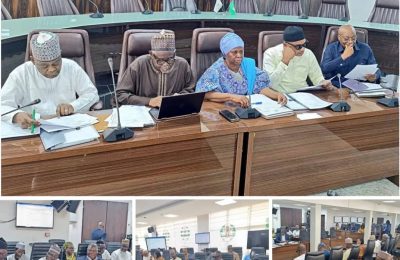
THE Federal Government has revealed that the current administration of President Bola Ahmed Tinubu has taken measures to address skill gaps among students and high number of out-of-school children in the country.

Minister of Education, Professor Tahir Mamman, who stated this, noted that equipping students with the right skills is the only answer to the joblessness faced by more than 75 percent of Nigerian school leavers.
He spoke at a two-day stakeholders’ consultative meeting on the National Policy on Skill Development in Abuja, organised by the Federal Ministry of Education and supported by the United Nations Children’s Fund (UNICEF) and United Nations Educational Scientific and Cultural Organisation (UNESCO).
He said the plan of the current administration is to ensure that the education system imparts the national values and lifelong skills that can make Nigerians connect to the society.
The Minister while emphasising the importance of skills development in shaping the future of education in Nigeria, insisted that the knowledge of skills must start from the early years through to the tertiary levels, saying this was the only way to empower the youths and make them self-reliant and employable.
He acknowledged the challenges facing the sector and encouraged stakeholders to collaborate and share resources to ensure the successful implementation of the policy.
He said: “As we move forward with the implementation of the National Policy on Skill Development, I urge all stakeholders to remain committed to our shared vision of providing quality education that equips our children with the skills they need to succeed.
“Let us work together to ensure that every child in Nigeria has access to inclusive and equitable education, and that our Education system is responsive to the needs of our economy and society,” Mamman stated.
The Minister noted that according to the available statistics, only 25 percent of students, who sit for West African Examination Council (WAEC) and National Examination Council (NECO), final year examinations annually proceed to tertiary institutions, noting that the 75 percent left have no employment, no education and no training.
“This is a very serious problem. However, skilling remains the structural way to address the out-of-school issue because when skills are acquired, there will no longer be people who are out-of-school,” he added.
He noted that stakeholders were already working on the policy on skills development with the expectations that the policy would be ready by July.
“The policy is already on ground but needs a lot of practical input to identify and provide in the curriculum the diversity of skills appropriate for each level of education. So, we should be done with this phase by July and start implementation by September,” he said.
Also, the chief of Education, UNICEF Nigeria, Saadhana Panday, said Nigeria’s education sector is challenged with crises ranging from out-of-school children, numeracy and literacy skills, among others.
Panday said that the challenges must be addressed headlong for Nigerian children to have competitive roles among their counterparts.
“One in four children is out-of- school, and three in four cannot read or solve simple mathematics problems.
“Only seven percent of youth aged between 15 and 24 have ICT skills. These numbers are more than statistics; they represent unfulfilled dreams and stunted opportunities for millions of young people,” she said.
UNICEF Education Manager Munamuzunga Sikaulu, in a remark, explained that the consultation is aimed at reflecting on the foundational literacy and numeracy skills, digital skills, transferable 21st century skills and job-specific skills.
Meanwhile, the National Council on Skills (NCS) has established a committee on coordination of Ministries, Departments and Agencies (MDAs) as well as States Programmes on Skills to tackle critical issues in the skills development sector.
Headed by the Minister of Education, Professor Tahir Mamman, the committee’s terms of reference include identifying skill training in MDAs and states, identifying dominant skills in the private sector, and devising strategies for standardisation, recognition, and certification.
The Council also proposed a draft bill for the Nigerian Skills Qualifications Framework (NSQF) aimed at developing the skills of the nation’s workforce and improving the quality of skilled workers.
A separate committee chaired by the Minister of Women Affairs, Mr Uju Kennedy-Ohaneye, has been tasked with reviewing the draft bill.
Addressing the fourth National Council on skills meeting at the Presidential Villa, Vice President Kashim Shettima reiterated the importance of seizing opportunities, particularly in the digital space.
“India is expected to earn $100 billion from outsourcing alone this year. We have a lot of unemployed graduates who can work comfortably from their homes and earn a minimum of $40,000 per annum. If we have one million Nigerian youths working in the digital space, we will earn more than what we generate from the sale of crude oil, and it will have a multiplier effect on our economy,” VP Shettima stated.
He urged the committees to work diligently as a team to address the challenges in the skills development sector, emphasizing the need to focus on high-earning skills in the rapidly changing global landscape.
Earlier, the Minister of Education, Prof. Mamman, noted the importance of integrating skills into the entire education sector for Nigeria’s true transformation.
“The whole idea is to bring skills into the entire education sector if Nigeria is to be truly transformative. The work of this council will be a major driver in accomplishing that,” he said.
Professor Mamman also highlighted the need for conducting skills surveys and labour market information to provide policymakers with reliable and timely data on job quality, skill gaps, and policy design for poverty reduction.
Read Also: We’re not thinking of merger with any political party — PDP








